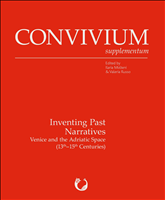Inventing Past Narratives. Venice and the Adriatic Space (13th-15th Centuries)
108 p.
During the Middle Ages, new past narratives emerged, but several of these narratives are not based on the archaeological rediscovery of a lost history. On the contrary, in many cases that impression of a unique, grandiose, and ancient past is partly the result of accurate dissimulation. Yet, it would not be exact to consider the myth of Venice as a fiction or, somehow, as a fabricated invention - an apocryphal creation that does not include any historical component. Instead, the myth of Venice has been generated through an intricate operation of composing unconnected pieces, through a process of attributing new meanings to previously unconnected pieces of different histories or objects from other pasts. The result is a patchwork that, through the longue durée, has been articulated around both new and ancient stories, local and foreign myths, reconstructed or rediscovered objects and narratives. By the late Middle Ages Venice becomes the main stage of a national and international myth: while enhancing its hist
orical role in the past, the city demonstrates the legitimacy of its role in the present. In light of such phenomenon, this volume will try to demonstrate that Venetian past narratives bring together heterogeneous materials to achieve a common result: that of celebrating Venice's triumph and erasing its weaknesses and defeats. [Publisher's text].
Special access authorizations may apply; please contact us for further information.


